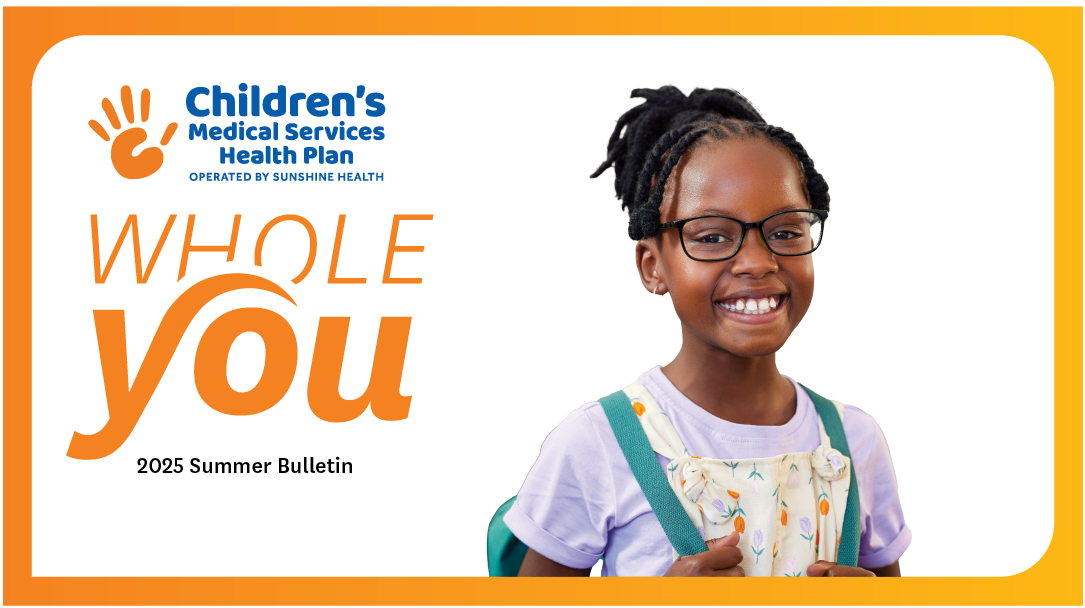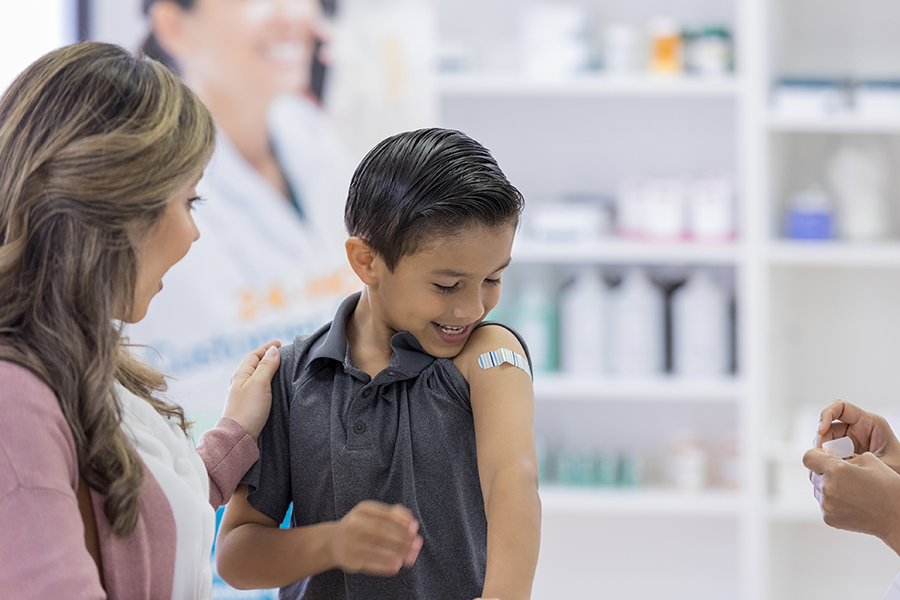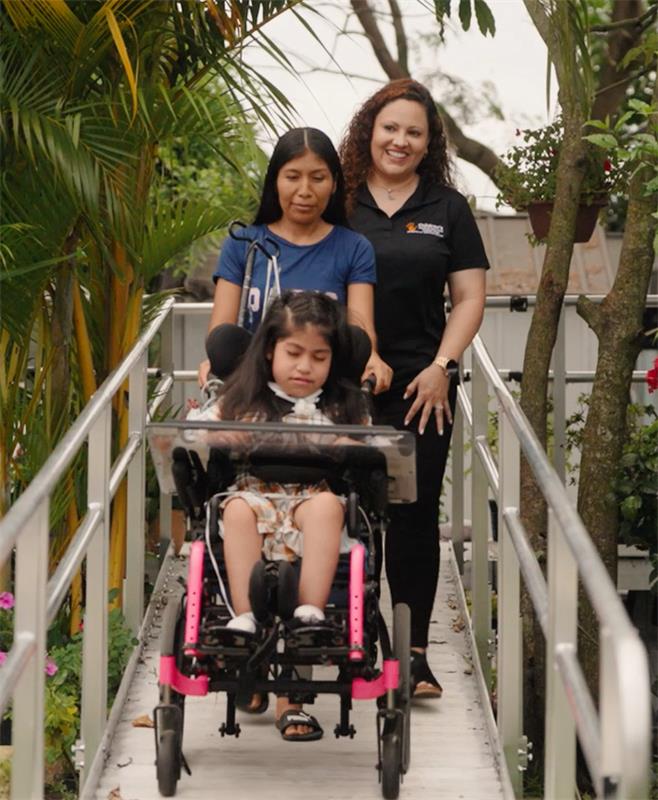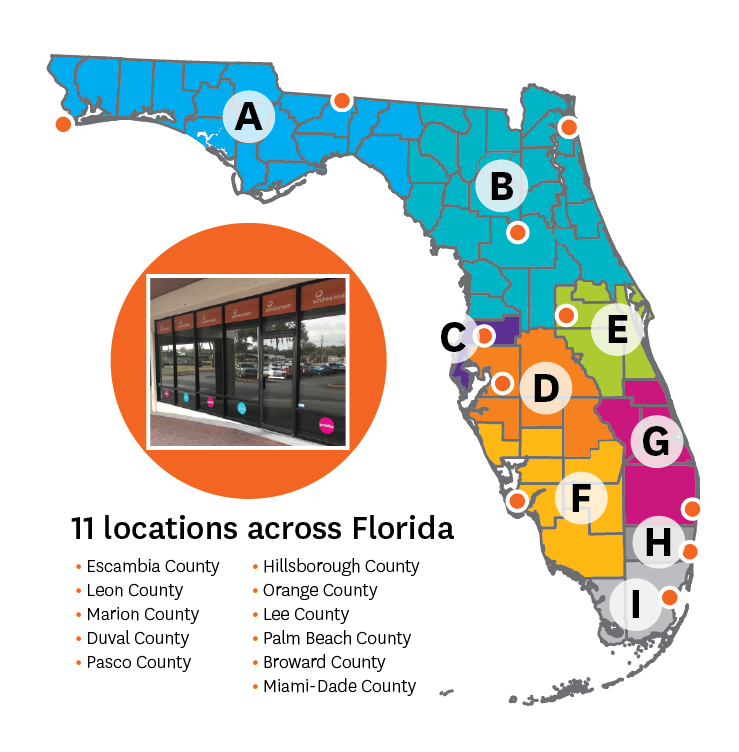Summer 2025

Welcome to our latest edition of Whole You, a newsletter from CMS Health Plan that helps you get the most out of your child’s benefits.
As summer comes to a close, you’ll find tips for keeping your child and family healthy during back-to-school season, nutritious meal ideas and behavioral health resources. Read up on exercise tips, celebrate Halloween safely and more.
Questions? Contact your child’s Care Manager or call Member Services at 1-866-799-5312 (TTY 1-800-955-8770).
Missed our last edition? Check out our spring 2025 newsletter.

Well child visits are annual checkups with your child’s primary care provider (PCP). These general wellness visits should be done once a year. Younger children under the age of 3 should visit the doctor more often. Most schools require students to have a wellness checkup once per calendar year, so make sure to book an appointment if you have not already!
What happens during a well child visit? The doctor may:
- Monitor your child’s blood pressure and heart
- Examine your child’s hearing and vision
- Ask about your child’s mental health
- Check your child’s height and weight
- Offer vaccinations
Make the most out of your child’s wellness visit:
- Ask questions about your child’s health
- Share concerns about your child’s sleep schedule, eating habits, behavior, growth or development
- Discuss tips on toilet training, feeding and safe sleep strategies
- Learn what resources are available that support your child
CMS Health Plan offers rewards when your child attends a wellness visit each year and completes health activities such as tests or screenings. This cash reward can be used for childcare, to purchase everyday items, pay bills and more.
- Well Child Visit (ages 0-30 months): Earn $10, one visit per calendar year with PCP.
- Well Child Visit (ages 3-21 years): Earn $20, one visit per calendar year with PCP.
- Lead Screening: For members up to age 2. Complete blood test for lead poisoning, earn $20. Rewarded once per calendar year.

Vaccines are shots that help keep people from getting sick. They teach the body how to fight germs that cause diseases like measles, chickenpox, or whooping cough.
Vaccines are especially important for kids because their immune systems are still growing. They can help your child’s body get ready to fight illness before they encounter it, which can keep them from getting really sick.
Vaccines are safe. Doctors and scientists test them a lot to make sure they work and don’t cause harm. Sometimes, after a vaccine, your child’s arm might feel sore or they might get a small fever, but that usually goes away quickly.
Getting vaccines should help your child feel better, meaning less visits to the doctor and less time away from school. If you have questions about your child’s vaccines, contact their primary care doctor.

School is starting soon, and CMS Health Plan is here to support your child’s learning through the School Liaison Program. Our school liaisons work with members and their parents to request evaluations for extra medical, behavioral and academic supports at school.
These supports are often called accommodations. They can include audio recordings of lectures, a notetaker, extra time on tests, and longer or frequent breaks during the school day, for example. A child’s accommodations are based on their specific needs.
School Liaison functions:
- Help request any medical services and accommodation that your child may need at school
- Coordinate your child’s school-based care with your child’s doctors
- Teach you about the Florida public school system and your child’s educational rights
Ask your child’s Care Manager for a referral to the School Liaison Program to get started. View other school resources from CMS Health.

Milagros Garcia, a 9-year-old born with spina bifida and Arnold Chiari malformation, had lived in a Skilled Nursing Facility more than an hour away from her family nearly all her life. Her mother, Isabel, dreamed of bringing her home, but worried she couldn’t give her daughter the extensive medical care she needed. CMS Care Manager Carolina Campos helped Isabel plan for a safe and smooth transition, and now Milagros is living at home with her family.

It is important to build a safe sleeping environment and sleep habits for your baby. Each year, there are 3,500 sleep-related deaths of babies in the United States. Follow and share these safe sleep tips with your family members and caregivers to ensure your baby stays safe while sleeping.
Safe Sleep Tips:
- Make sure your baby is sleeping on their back, face up.
- Place your baby’s crib nearby and respond to them if they cry or yell during the night.
- Never share a bed with your baby. They should have their own bed surface.
- Do not place blankets, stuffed animals, soft toys or pillows in the crib. Keep the bed bare, with only tight-fitting sheets.
- The mattress should be firm, not soft. Avoid placing your baby on your bed, sofa or other soft surfaces.
Childhood obesity can increase the risk of chronic diseases, like type 2 diabetes, coronary heart disease, asthma and other health problems. Children who are severely overweight may also have high blood pressure, sleep problems and achy bones.
To keep your child feeling their best, it’s important that they stay active and eat a healthy, well-rounded diet made up of fruits, vegetables, protein and whole grains. Try to stay away from sugary drinks and make your child drink plenty of water throughout the day to stay hydrated.
Fun Exercise Tips for Children:
- Go Outside! Take your child outside and explore your neighborhood for thirty minutes. You can walk or bike to get some fresh air and mix up your routine.
- Have a Dance Party! Play your child’s favorite songs and dance. This keeps your child active, and you get to spend quality time with them.
- Make the Ultimate Obstacle Course! Create an obstacle course with items found around your house. Some ideas: chalk, hula hoops, jump ropes, sports balls, string, blankets, pillows and other everyday objects. You can also move your furniture around to form the course and use a piece of string or a folded-up blanket to make a finish line.

Quick Breakfasts to Start the Day Strong:
Start your day with protein for more energy and better metabolism. Protein helps build muscles and keeps you feeling full. Here are four easy, healthy and tasty ideas.
- Make Oatmeal. Oatmeal is a great choice to keep you feeling full until lunch. Use skim milk instead of water to boost protein. Top with fresh fruit and nuts to add crunch and extra nutrition.
- Go Greek. Plain, unsweetened Greek yogurt helps your muscle, hair and skin health. Dress it up by making your own chia peanut butter yogurt bowl. Start with yogurt as your base and add two tablespoons of natural peanut butter. Next, add chia seeds. Top it off with chopped blueberries and bananas. Use plain yogurt or make smart choices that limit added sugar. Read the nutrition label to make the best choice.
- Pick Peanut Butter. A single serving is packed with protein. This makes it a better choice for whole grain toast than butter or jelly. Be sure to measure out two tablespoons. Also check the label to check for added sugar. These steps help you keep calories in check.
Try peanut butter, strawberry and banana quesadillas for another yummy option. To make, spread one tablespoon of natural peanut butter on two whole wheat tortillas. Top one tortilla with slices of banana, strawberry and a sprinkle of cinnamon. Put the other tortilla on top and press gently to help stick together. Cook each side in a skillet on medium heat for three minutes or until golden brown.
Get rewarded: Members ages 10 and older can earn a $20 reward by completing weight loss health coaching sessions. Children under 18 must submit a consent form signed by member’s parent/guardian, verbally pledge to lose weight within 30 days and complete six sessions within six months. Learn more about our disease management programs.
Free groceries: Visit one of Sunshine Health’s monthly food pantries held at Community Connections Centers to get fresh and shelf-stable foods. Pick up is held from 9 a.m. to noon, on the third Thursday of each month. All are welcome on a first-come, first-served basis. You do not need to be a Sunshine Health or CMS Health Plan member.

Halloween is a time for costumes, candy, and fun, but safety should always come first. If you're trick-or-treating, these simple tips will help keep you and your family safe:
- Stick to well-lit areas. Use flashlights or glow sticks so drivers can see you. Avoid dark neighborhoods.
- Stay with a group. Don’t let your children go door-to-door without an adult.
- Check costumes. Make sure masks don’t block vision, and costumes are short enough to avoid tripping. Test makeup first to make sure it doesn’t cause a reaction.
- Watch for traffic. Cross streets at corners or crosswalks, never between parked cars. Make eye contact with drivers before crossing.
- Inspect all treats. Throw away anything unwrapped or homemade, unless it’s from someone you know and trust.
- Watch for allergies. Check ingredients for allergies before letting your child dig in.
See, with just a little prep, Halloween can be both spooky and safe. Stay alert, stay visible, and have fun!

Have you noticed your child withdrawing from others or struggling with eating habits, having sleeping problems or experiencing intense emotions? These could be signs of depression, anxiety or ADHD.
Check in with your child and see how you can help. It is important that you talk to them, ask questions and tell them that you are there for them. Let them know that you want them to feel safe and that doctors can help, in person or right from home.
Brave Health is an online mental health provider that CMS Health Plan members 13 and older can access from the comfort of their home. This virtual health service provides mental and behavioral care such as therapy, psychiatry and support. Clients can book an appointment and virtually meet with a therapist or other mental health professional through Brave Health.
Other Brave Health services include:
- Therapy (one-on-one or group)
- Customized mental health treatment plans
- Support groups and specialty programs
Text or call Brave Health at 1-305-902-6347, Monday through Friday, 8 a.m. to 6 p.m. Eastern. You can also email start@bebravehealth.com. Learn more about telehealth.
Sunshine Health’s Community Connections Centers are spread across Florida and open to the public as places to gather, learn and connect.
Members can visit to get help managing health plan benefits and get connected to social services and community support. Visitors can also access computers, the internet and other resources. Contact your local center for a schedule of events.
Monthly Food Pantry:
Community Connections Centers host monthly food pantries. Visit to get fresh and shelf-stable foods for your family. Pickup is from 9 a.m. to noon on the third Thursday of each month. All are welcome on a first-come, first-served basis. You do not need to be a Sunshine Health or CMS Health Plan member to get food from the pantry.

Region A
(Escambia County)
2620 Creighton Road, Suite 401
Pensacola, FL 32504
1-850-473-2801
(Leon County)
2525 S Monroe St., Unit 1
Tallahassee, FL 32301
1-850-523-4301
Region B
(Marion County)
2724 NE 14th St.
Ocala, FL 34470
1-352-840-1102
(Duval County)
5115 Normandy Blvd., Unit 1
Jacksonville, FL 32205
1-904-348-5267
Region D
(Hillsborough County)
200 W Waters Ave.
Tampa, FL 33604
1-813-470-5651
Region E
(Orange County)
6801 W Colonial Drive, Suite E
Orlando, FL 32818
1-407-253-7602
Region F
(Lee County)
4901 Palm Beach Blvd., Suite 80
Fort Myers, FL 33905
1-239-690-5722
Region G
(Palm Beach County)
4278 Okeechobee Blvd.
West Palm Beach, FL 33409
1-561-337-3508
Region H
(Broward County)
1299 NW 40th Ave. Suite C
Lauderhill, FL 33313
1-954-400-6479
Region I
(Miami-Dade County)
9552 SW 160th St.
Miami, FL 33157
1-786-573-7801
Was your child diagnosed with a condition such as ADHD, anxiety, autism, epilepsy, depression or another common disease? This can be a lot to take in and there is a lot of information out there on how to help your child.
Our diagnosis specific guides cover signs and symptoms of some common conditions. You can learn more about certain conditions, how you can help your child, what treatment options are available, how CMS Health Plan can help and access low-cost resources.
Visit our diagnosis guides webpage to learn how CMS Health Plan can guide you to understand your child’s diagnosis. We have guides on:
- ADHD
- Anxiety
- Asthma
- Autism
- Cerebral Palsy
- Depression
- Diabetes
- Disruptive Behavior Disorders
- Epilepsy
- Sickle Cell
If your child’s diagnosis is not listed, there are other ways you can get help, support, or ask questions:
- Call your child’s Care Manager
- Call Member Services at 1-866-799-5321, Monday through Friday, 8 a.m. to 8 p.m. Eastern
